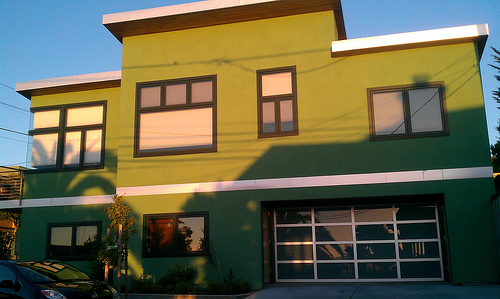Help! My Garage Door Does Not Close!

Photo of a very nice modern garage door by shanestar/Flickr.
Garage doors can be spiteful. They seem to know when it's raining or sleeting or you're running especially late, and they choose that moment to act up. During a recent cold snap in Colorado, my garage door opener acted like something was in the door's path and refused to close it. Tinkering with the safety sensors didn't help. So I simply overrode the system by holding down the wall button until the door was completely closed. After a few days, when the weather warmed up 20 degrees or so, the problem went away. I've heard that cold can mess with electronics but who knows ... In any case, there are several easy things to check if your garage door won't close.
Drive Problems
The simple electric motors on garage door openers are extremely reliable and tend to outlive most other parts of the drive system. If your opener's motor unit seems to be getting power yet the door just won't budge, there's probably a failure in the parts that actually move the door. Many chain-drive systems have plastic gears that wear out over time but are relatively easy to replace. Screw-drive openers have a carriage that moves back and forth along the screw shaft, with teeth or gears that can fail. These also are easily replaced. Belt-drive openers may have problems with belts, pulleys and related gearing.
Remote
If your garage door opener works when you use the wall button but doesn't close (or open) with the remote, replace the batteries in the remote. If that doesn't help, try using a different remote. If that doesn't close the door either, you might have a bad remote sensor on the motor unit. And there's one other common possibility: If you programmed your car's built-in remote transmitter and it stops working, try the regular remote that came with the opener. If that one works, reprogram the car's transmitter.
Safety System
If your garage door starts to close but then goes back up automatically—typically followed by a series of light flashes—chances are something is triggering the safety system. Check the infrared sensor units that point at each other across the bottom of the door opening. Both should have a solid green light, with no flickering. Make sure the lenses of the sensors are clean and the wires to the units are properly attached. This is perhaps the most common fix on a modern garage door opener.
Another feature of the safety system is that if the door senses unusual pressure or resistance while closing, it will reverse itself, thinking that something is blocking its path. Hold the wall button and watch the door as it goes down. If it catches or binds along the way, that could be where the reversing sensor is tripping. This is likely a mechanical problem with the door or track system, rather than the opener.
Limit Switch
Limit switches tell the opener when to stop opening or closing the door. If the "close" limit switch isn't set properly, the opener can keep pushing on the door even after it touches the ground. This triggers the safety sensor that guards against unusual pressure, so that the opener reverses automatically and opens the door again. Many limit switches are adjustable via screws or knobs on the motor unit, but on some chain-drive openers, the switches are actually lugs that attach to the chain; you simply move the appropriate lug to adjust the closing limit.
Doors Without Openers
If you're still kickin' it old school and open your garage door manually, the door isn't likely to stop closing suddenly unless something's stuck in one of the tracks or you've recently missed the big opening when pulling out or docking your car. A severely neglected door tends to provide some advance warning that it might stop working for you.
In any case, the problem should be mechanical, such as a broken hinge or missing roller -- anything that works against the door's normal travel or allows a door panel to fall out of whack. A broken door spring shouldn't prevent a door closing: it's there to help you open the door. But if you have extension springs (the kind that run parallel to the upper, horizontal parts of the tracks), having one break could pull the door out of alignment, making it hard to close. If you suspect a spring problem, have it checked right away by a garage door repair pro.
Updated February 26, 2018.
Looking for a Pro? Call us (866) 441-6648

Garage door Average Costs
Garage Door Pros Experiences

Brand New Garage Door Opener Motor Installed In A Brand New Home

Emergency Garage Door Replacement



